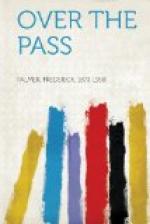The Doge nodded.
“As I saw you,” he said.
Jack looked at Mary, frankly and calmly.
“Was I truly?” he asked her.
“As I saw you!” she repeated, as an impersonal, honest witness.
“Then I must have been!” he said, with conviction. “But I hope that I shall not be in the future.” And he smiled at Mary wistfully. But her gaze was bent on the ground.
“And you want it all—all the story from me?” the Doge asked, hesitating.
“All!” Jack answered.
“It strikes hard at your father.”
“The truth must strike where it will, now!”
“Then, your face, so like your father’s, stood for the wreck of two lives to me, and for recollections in my own career that tinged my view of you, Jack. You were one newcomer to Little Rivers to whom I could not wholly apply the desert rule of oblivion to the past and judgment of every man solely by his conduct in this community. No! It was out of the question that I could ever look at you without thinking who you were.
“You know, of course, that your father and I spent our boyhood in Burbridge. Once I found that he had told me an untruth and we had our difference out, as boys will; and, as I was in the right, he confessed the lie before I let him up. That defeat was a hurt to his egoism that he could not forget. He was that way, John Wingfield, in his egoism. It was like flint, and his ambition and energy were without bounds. I remember he would say when teased that some day he should have more money than all the town together, and when he had money no one would dare to tease him. He had a remarkable gift of ingratiation with anyone who could be of service to him. My uncle, who was the head of the family, was fond of him; he saw the possibilities of success in this smart youngster in a New England village. It was the Ewold money that gave John Wingfield his start. With it he bought the store in which he began as a clerk. He lost a good part of the Ewold fortune later in one of his enterprises that did not turn out well. But all this is trifling beside what is to come.
“He went on to his great commercial career. I, poor fool, was an egoist, too. I tried to paint. I had taste, but no talent. In outbursts of despair my critical discrimination consigned my own work to the rubbish heap. I tried to write books, only to find that all I had was a head stuffed with learning, mixed with the philosophy that is death to the concentrated application that means positive accomplishment. But I could not create. I was by nature only a drinker at the fountain; only a student, the pitiful student who could read his Caesar at eight, learn a language without half trying, but with no ability to make my knowledge of service; with no masterful purpose of my own—a failure!”
“No one is a failure who spreads kindliness and culture as he goes through life,” Jack interrupted, earnestly; “who gives of himself unstintedly as you have; who teaches people to bring a tribute of flowers to a convalescent! Why, to found a town and make the desert bloom—that is better than to add another book to the weight of library shelves or to get a picture on the line!”




